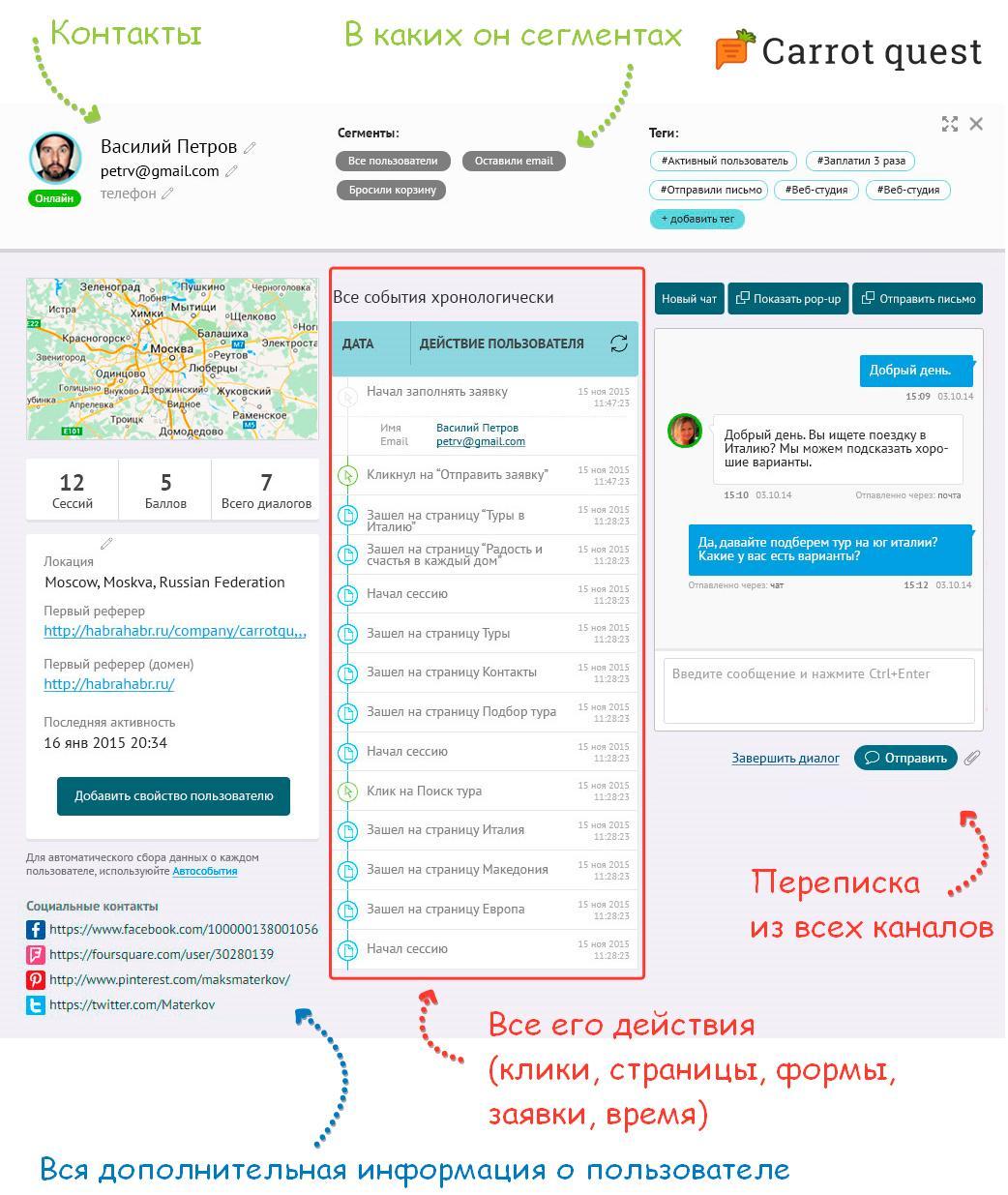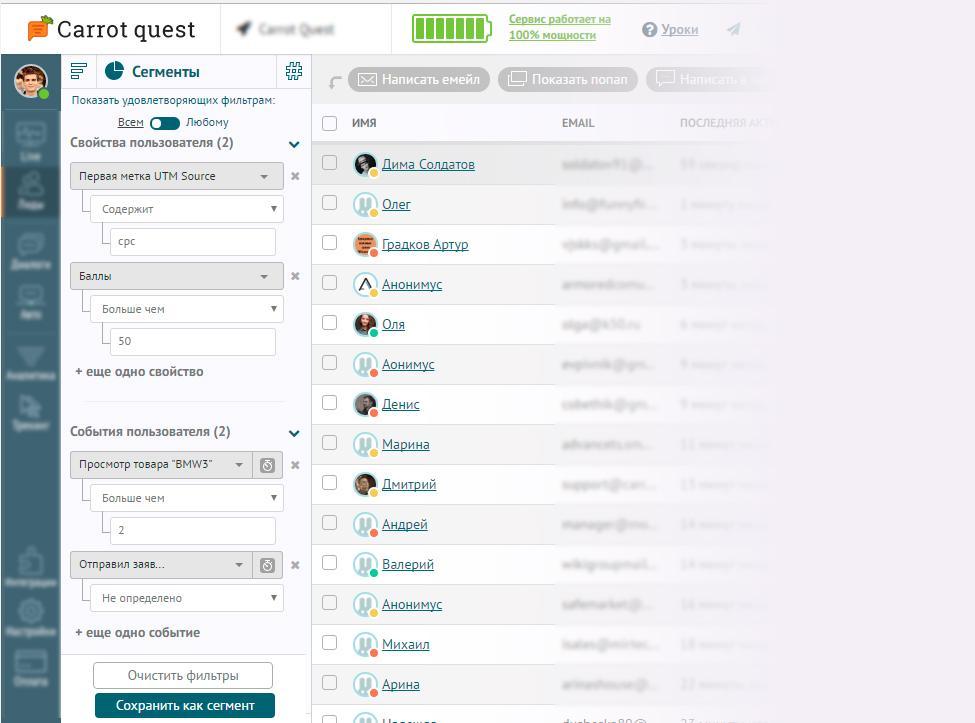How to determine hot leads in 3 steps to make a sale and why 95% of companies do not know how

If Russian companies, one way or another, have already learned to work with traffic and getting leads, then the following steps still cause difficulties - where the lead is processed, divided into segments and led to the purchase personally (perhaps even automatically). This is the bottleneck of many companies. Let's understand this question together with the marketing automation service team - Carrot Quest .

Remember how it usually happens and you will understand why for many lead companies this is one gray mass and their conversion into a purchase leaves much to be desired.
')
- Information about user actions is collected in Google Analytics or YandexMetrica; Contacts are collected and sent to CRM; Correspondence is conducted in chat or by mail and is not transmitted to a single channel. It seems that in each channel there is some information about a person, but without association it is useless - the lead is often simply lost.
- Or how do marketers hand over leads to sales? Without any useful lead information. Those have to work with the user again, as if he and was not on the site, and the company does not have any useful information about him. But this knowledge is very valuable.
- Many people think that once 1-1.5% of visitors reach the purchase, no work needs to be done with the users - they will buy it themselves. This is a mistake, because in the final stages the user’s sense of risk sharpens and he leaves without your help. Want a conversion 2 times higher? Help them buy from you!
If you continue to work with a faceless mass of users: do not divide them into segments based on behavior and do not work with each segment personally, then there can be no increase in sales.
Everything is simple - company employees do not see which lead is ready to buy and lose potential customers already at the final stages, when the purchase is just around the corner.
Getting closer - lead as a mother
If you do not intend to put up with it, then you have 2 options:
- If you have a very large company and have their own development departments, where a couple of dozen experts work, then you can program your own system, which will combine the necessary tools for working with leads. In this case, you can create it completely under your processes.
- Small and medium-sized companies should use Marketing Automation-services, in which all these tools already exist and they are suitable for different business areas. Services collect all the information about each visitor to your site and help guide them to the purchase, both manually and automatically - this allows you to manage the customer's life cycle and personally guide them from the moment you visit the site to the purchase. Of the foreign services, I would advise HubSpot and Intercom , from the Russian — Carrot Quest service and the Mindbox automation service .

How it works on the example of the Carrot quest service
Immediately analyze the example of the Russian-language service Carrot Quest and further comparable with the English-language Intercom.
Carrot Quest is a service that collects important information about each visitor to your site and, on the basis of this data, helps guide them to purchase, both manually and automatically.
Having passed these 3 steps, in a week you will be able to divide the leads into different segments and in the first days convert them into customers.
1. We collect important data about each user on the site.
It is important that to collect basic information about the visitor does not need the help of a programmer. Marketers set up the service in 2-3 hours. Some of the information begins to be collected automatically, and you quickly set up the rest in a special data collection wizard.
The service collects and writes key data about each user into a personal card. There you can find all the information about the person, as in the example below.

Your employee enters the card and sees all the information about the user. In the additional information (indicated in the screenshot above), the user's properties important for you will be added and stored - for example, the amount of the last purchase.
2. Determine the segment of leads that are already ready for purchase.
Use user information as a trigger for running automatic scripts (mailings, active messages) or for manual work, which we will discuss later.
In any business, you can always determine the readiness to purchase by the behavior of the user (collecting data about him). Naturally, in different areas the interpretation of this behavior is different and will be individual for each company.
For example:
- The user began to make an application for the service 2 or more times, but never completed it;
- I came from contextual advertising, 3 or more times I looked through the card of the same product (washing vacuum cleaner);
- I subscribed to a newsletter on internet marketing on a blog and have already read 5 special warming up letters;
- I looked through the description of your service, after which I called the company, but never submitted an application;
- I bought dog food 3 months ago, and you know that Husky eats his food in 3.5 months. (Remind him to buy new packaging from you);
You can select, save and work with such a segment in the future. We'll talk about work examples in the next step.
Example. In the picture, we have identified a small segment for car dealership dealers:
Users came from contextual advertising, scored a high scoring score (for targeted actions on the site), viewed the page from the BMW 3 Series more than 2 times, without sending a request. This is a hot lead, who is interested in this particular car, you need to contact him or push to leave a request, otherwise he may not return and go to a competitor.

So you have identified a segment that is interested in a particular product, you need to contact them - this can be done individually with each or contact the whole segment at once.
3. With the help of additional tools we involve users in the next stage.
When you have filtered users and selected a segment of interest, you can write to it here in any channel that is relevant for a specific situation. If he left email, then write him a letter. If you did not leave the email, then write a message to him in the chat or send a pop-up window, he will see it when he comes to the site again. So you push him to the next stage of the funnel, otherwise he could not return and be lost forever.
All these actions manually should be done only at the stages of testing. When you understand what content and in which channels each individual segment best converts, then run automatic scripts, and the automation service itself will “communicate” with the user at a certain moment and guide him through the funnel.
For example, the easiest and fastest case. The user began to make a purchase “application”, but never finished. The service will simply send him a letter urging him to do this (for example, complete the purchase in the online store and offer a 5% discount). So we do not allow the user to fall off at an intermediate stage.
How it works on the example of the Intercom service
Intercom is similar in functionality to Carrot Quest, the main difference here is user analytics. Everything else happens in the same scenario:
- You configure the collection of information about each visitor;
- select the desired segment:

3. send a message to the selected segment or a specific user:

We will not go into the technical details of user analytics: in Intercom it is quite difficult to set up automation (for this you need programmers), but it is also great for personal contact when you manually guide the user.
Intercom is most focused on organizing support in SaaS services, so it automatically divides users into 2 main groups: before registration and after registration. For support to work only with registered users, and ordinary visitors to the site were not taken into account and data about them was not collected.
We strive to make user experience as simple and pleasant as possible. We wish you high conversions and happy users.
With pleasure, Carrot Quest , a service that automatically collects information about each visitor to your site and helps to guide him to purchase, both manually and automatically.
Source: https://habr.com/ru/post/315328/
All Articles